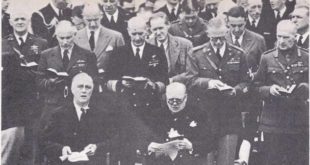Even before Pearl Harbour, there had been cooperation between the United States and Britain. In August of 1941, President Roosevelt and Prime Minister Churchill met secretly, on a cruiser at sea off the coast of Newfoundland. There they drew up the Atlantic Charter, a document stating the principles on which they based their hopes for a better future for the world. They pledged that neither country would seek more territory. They hoped that, “after the final destruction of Nazi tyranny,” all men in all lands could “live out their lives in freedom from want and fear,” and they called on …
Read More »Tag Archives: Crimea
Russia Under the Tsars 1462-1796
IN THE LAST PART of the fifteenth century, the monks and courtiers of Moscow began to say that Moscow was destined to become the “Third Rome.” The first Rome, they said had been great as the centre of Christianity; but when the Romans had recognized the pope, Rome had been punished by destruction. The second Rome had been Constantinople, the centre of the Orthodox Church; but Constantinople, too, had briefly recognized the pope, and it, too, had fallen. Now Moscow, where the Orthodox faith still remained pure, was to become the Third Rome — the great centre of the Christian …
Read More »The Ottomans, the Last Great Islamic Power A.D. 1299-1922
ACCORDING to their tradition, the Ottoman Turks once belonged to the same Central Asian tribe as the Seljuk Turks. Their ancestors came to Asia Minor with the Seljuks. In time, they began to challenge the authority of their fellow Turks. The Ottomans took their name from a chieftain called Othman, who in 1299 became the emir of Seljuk lands bordering on the Byzantine Empire. Othman declared holy war on his Christian neighbours. His son Orkhan captured the city of Brusa and in 1362 Orkhan’s son Murad took Adrianople, beyond the strait and sea that separated Asia Minor from Europe. Thereafter, …
Read More »

